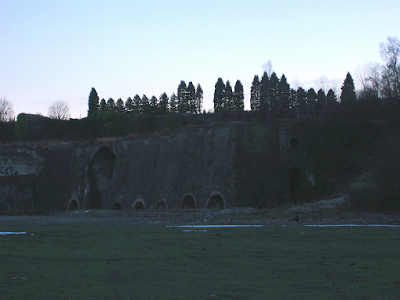 |
| Cyfarthfa Blast Furnaces |
The Cyfarthfa Works Haunted.
The chief dramatis personae in the wonderful scenes related are gentlemen of the highest integrity and of unblemished reputation. They, we have no doubt, believe that their experiences were stubborn realities.
"I had occasion," says the narrator of this most remarkable adventure, "to visit Cyfarthfa Works at night lately, in company with a friend. Cyfarthfa works have been familiar to me for many years, but they were associated with the fullest activity, with the glare of furnaces, the whirl of the rolls; and that picture was vividly in my imagination when we stood at length before the works that were slumbering in thick darkness, and as silent as the grave. No change could have been greater, no stillness more profound. We were far enough from the town to lose its glare and its noise, and outof the way of the people journeying from one place to another.
"We stood a while just within the dense shadow of one of the mills, just tracing the ponderous wheels and the dimly outlined rolls, when suddenly the huge wheels croaked and began to revolve, the rolls to move, and in a moment there was all the whirl of industry again, only needing the glare of light and forms of men to assure us that the works were in full action. My companion, with an exclamation of profound astonishment, clasped me by the arm.
"Cast iron man as he is, strong-minded and proof against the superstitions of the age, I felt his voice tremble as he said, 'This is most strange. There are no men here; the works are stopped; no steam, no motive power.' And the grip on my arm became severe. I, too, felt alarmed, and am not ashamed to confess it. My imagination, livelier than that of his, conjured up misty shades, and I saw shapes flitting to and fro, and heard the cry of men and boys amidst the clanging iron. Involuntarily we stepped back into the air, and as suddenly as the medley arose, so it died away: not a wheel moved, all was hushed and at rest.
"We walked away a little distance, our purpose unaccomplished. My friend better able than I to afford a clue, was, like myself, utterly at sea, and could give no explanation. 'But,' said he, resolutely, 'it must be [?]ed, and we will find it out.' With these words he hurried back again to the works. I followed, and in a few minutes again stood looking into the silent mill. There was the same strange hush, the same weird gloom that appeared palpable did we but attempt to grasp it; but no sound. 'Was it fancy?' said my friend, with his cheerful laugh. He had scarcely spoken when the great wheel again revolved, and machinery here and there, to the right, to the left, ponderous wheels and rolls, all sprang into motion and the din of work was perfect in its fullness. With this came the clanging of falling iron, the rattle of trams sounded strangely alike, and again the impression was strong that puddlers and moulders flitted by, and ghostly labour went on.
"This was sufficient for us. We hurriedly left the scene, and on our way home met one of the old ironworkers of Cyfarthfa going to Cefn, to whom my friend related the circumstance. He knew the man as an old and respectable inhabitant, and made no secret of what we had heard. 'Ha,' stopping and leaning on his stick, 'I have heard it too'; and, sinking his voice, he continued, 'it always comes when the works are stopped. It did one time before, many years ago, and when Mr. Robert was living it came again. No one can say what is the reason, and perhaps it is best not to make any stir about it.'"
Our correspondent has not done the same as the over-man, but gives the narrative. He adds "This I know, that the hearts of the Crawshays have been bound up with their great iron industry. Richard was never happier than in his works, William never slept so well as in the sound of his great hammer. Robert's last look of keenest interest was on the old furnaces and mills. If omens are true in these secular as in Scriptural days, and to the degenerate Briton as to the Greek and Roman, let us accept it as an augury of good, and these ghostly shadows forerunners of the big event, a genuine practical start at Cyfarthfa."
--Weekly Mail, Aug. 20th.
In the Cornishman, 25th August 1881.
According to dear Wikipedia, the works closed in 1875, but they were rebuilt and reopened in 1884. Who knows if this story is a genuine anecdote from someone, or more a bit of publicity for the site and the family's efforts to get it going again. It would have been very important to the local economy, so people would have been keen for that to happen, I'd expect. I'm erring on that side really.
It's a huge site by all accounts, and it fell into disrepair in the 1920s. It now looks pretty spooky judging by the photo below (well, if you're there in the dark ).
 |
| Photo by Perceval, of the abandoned Cyfarthfa Ironworks at Merthyr Tydfil. |